Classic Commentaries and Studies on Ecclesiastes and Song of Songs (14 vols.)
Digital Logos Edition
Overview
In this series, some of the top scholars of the last three centuries explore two of the most unique books of the Bible: Ecclesiastes and the Song of Songs. These classic volumes examine topics such as authorship, the peculiar text of the Septuagint, and the age and character of the books. The collection also includes devotional texts that apply ancient wisdom to contemporary Christian life. These volumes have had an enduring impact on Old Testament exegesis, and this exceptional collection provides easy accessibility to this wealth of significant scholarship.
In the Logos editions, these volumes are enhanced by amazing functionality. Important terms link to dictionaries, encyclopedias, and a wealth of other resources in your digital library. Perform powerful searches to find exactly what you’re looking for. Take the discussion with you using tablet and mobile apps. With Logos Bible Software, the most efficient and comprehensive research tools are in one place, so you get the most out of your study.
Be sure to check out more Classic Commentaries and Studies on the Song of Songs (24 vols.).
This title is included in the following collections
You can save when you purchase this product as part of a collection.
Logos 9 Portfolio Legacy Libra...
$4,749.99$4,749.99Logos 9 Collector's Edition Le...
$11,399.99$11,399.99Logos 9 Ultimate Legacy Librar...
$24,999.99$24,999.99

Key Features
- Provides in-depth discussion, interpretation, and application of Ecclesiastes and Song of Songs
- Explores the unique readings of the Septuagint
- Highlights classic studies from the last three centuries
Product Details
- Title: Classic Commentaries and Studies on Ecclesiastes and Song of Songs
- Volumes: 14
- Pages: 2,966
- Resource Type: Commentaries
- Topic: Ecclesiastes, Song of Songs
Individual Titles
- Pessimism and Love in Ecclesiastes and the Song of Songs by D. Russell Scott
- The Book of Ecclesiastes and the Canticle of Canticles by Roland E. Murphy
- Ancient Wisdom for Modern Men: Being Notes and Comments on the Book of Ecclesiastes by Joseph J. Elliott
- A Commentary on Ecclesiastes by Thomas P. Dale
- Ecclesiastes: The Book of the Natural Man by W.J. Erdman
- Words of Koheleth: Son of David, King in Jerusalem by John F. Genung
- Cohelet, or, the Preacher: Translated from the Hebrew, with a Study on the Age and Character of the Book by Ernest Renan
- The Song of Songs: Translated from the Hebrew, with a Study of the Plan, the Age, and the Character of the Poem by Ernest Renan
- The Lily among Thorns: A Study of the Biblical Drama Entitled: The Song of Songs by William E. Griffis
- Clavis Cantici: An Exposition on the Song of Solomon by James Durham
- Joined to the Lord: Thoughts on the Song of Solomon by Annie W. Marston
- Thy Hidden Ones: Union with Christ Traced in the Song of Songs by Jessie Penn-Lewis
- The Heavenly Courtship: Solomon’s Song of Songs by A.S. Copley
- A New Translation of Proverbs, Ecclesiastes, and the Canticles with Introductions and Notes by George R. Noyes
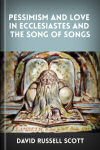
David R. Scott discusses Ecclesiastes in four sections: the pessimist, the hedonist, the pietist, and the sophist, or wise man. This structure emphasizes the idea that the writer of Ecclesiastes wrote based on different modes of thinking—or as the result of an internal mental debate. Scott also covers Songs of Songs in a section entitled Love Songs of the Bible.
David R. Scott was Pusey and Ellerton Hebrew Scholar at the University of Oxford.
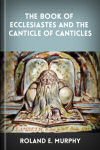
The Book of Ecclesiastes and the Canticle of Canticles
- Author: Roland E. Murphy
- Publisher: Paulist Press
- Publication Date: 1961
- Pages: 95
In this volume, catholic priest Roland E. Murphy examines Ecclesiastes and the Canticle of Canticles (Songs of Songs). Murphy’s rigorous commentary also provides accessible insights for the layperson.
Roland E. Murphy (1917–2002) was an American Catholic priest of the Carmelite order, a biblical scholar, and a specialist in the study of the Old Testament. He was the George Washington Ivey Professor of Biblical Studies at Duke University and taught at the Catholic University of America. Murphy served as editor-in-chief of Catholic Bible Quarterly and was member and president of both the Catholic Biblical Associaton and the Society of Biblical Literature. He is the author of the commentaries on Ecclesiastes and Proverbs in the Word Biblical Commentary (WBC) (61 vols.).
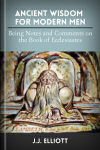
In this volume, Joseph J. Elliott argues for King Solomon as the author of Ecclesiastes. Elliott also examines Ecclesiastes form as a public discourse given by a king and a sinner—a discourse that is at least in part confession and in part ironic.
John J. Elliott was an early twentieth-century biblical scholar.
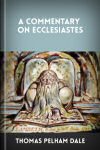
This commentary differs from many of its predecessors by giving greater weight to the interpretation of their peculiar renderings in LXX. Thomas P. Dale points out that the strange renderings of the LXX are often dismissed as mere errors. Dale argues that since the LXX is the oldest translation and the only one created while Hebrew was still used as a language, its renderings deserve closer attention.
Thomas P. Dale (1821–1892) was an English Anglo-Catholic priest. He graduated from Sidney Sussex College in 1845. Dale was ordained as a deacon in 1845 and as priest in 1846. He was also appointed curate of the Camden Chapel, Camberwell, Surrey. In 1847, he became rector of St Vedast Foster Lane in the London.
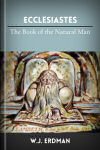
In this book, W.J. Erdman makes the case that despite the difficulty for some in understanding Ecclesiastes and its place in the Bible, it fits comfortably into the canon of sacred scripture. Erdman argues that like all the books of the Old Testament, it can only be fully understood in light of the New Testament and the person of Jesus Christ.
W.J. Erdman was a member of the Chicago Presbytery. He was born in Pennsylvania and was brought up religiously in the doctrines and usages of the Dutch Reformed Church. He received his theological education at the Union Theological Seminary in New York.
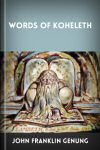
In this volume, John Genung translates Ecclesiastes and includes his own study of its literary and spiritual value. Genung also provides a running commentary, pointing out that people tend to see only the negative in Ecclesiastes. He explains how there is much that is positive and affirming in Ecclesiastes.
John F. Genung (1850–1919) was a Baptist minister before becoming professor of rhetoric at Amherst College in 1882. Genung was a respected literary critic and is also the author of The Epic of the Inner Life: Being the Book of Job.
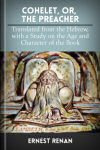
In this book, Ernest Renan translates the Hebrew text and attempts to explain the Songs of Songs and resolve some of the difficulties it presents, while studying the age and character of the book. Renan presents the theory that the author of Ecclesiastes has merely borrowed Solomon’s name for the ideas presented in the book.
Ernest Renan (1823–1892) was a French expert of Middle East ancient languages and civilizations (philology), philosopher, historian, and writer, devoted to his native province of Brittany. He is the author of Saint Paul and Life of Jesus. He is best known for his influential historical works on early Christianity, and his political theories, especially concerning nationalism and national identity. Renan is credited as being among the first scholars to advance the Khazar theory, which held that Ashkenazi Jews were descendants of Turkic peoples who had adopted Jewish religion and migrated to Western Europe following the collapse of their khanate.
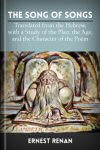
Ernest Renan studies the plan, age, and character of the Song of Songs, demonstrating his belief that it couldn’t have been written by Solomon. He also introduces a translation of the book, dividing it into a drama of five acts—a literary device that has been criticized and is addressed by Renan in the book.
Ernest Renan (1823–1892) was a French expert of Middle East ancient languages and civilizations (philology), philosopher, historian, and writer, devoted to his native province of Brittany. He is the author of Saint Paul and Life of Jesus. He is best known for his influential historical works on early Christianity, and his political theories, especially concerning nationalism and national identity. Renan is credited as being among the first scholars to advance the Khazar theory, which held that Ashkenazi Jews were descendants of Turkic peoples who had adopted Jewish religion and migrated to Western Europe following the collapse of their khanate.
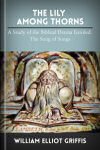
In this book, William E. Griffis explains how no book of the Bible has been so opaque to readers as the Song of Songs. His illuminating studies are based on the Revised Version of 1884, which removed the chapter headings that were in the English version, and showed the Song of Songs dramatic structure.
William E. Griffis (1843–1928) was an American Congregational minister and author born in Philadelphia, Pennsylvania. He studied at the seminary of the Reformed Church in America in New Brunswick (known today as the New Brunswick Theological Seminary). Griffis attended Union Theological Seminary and was afterward called to the ministry.
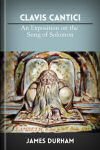
Charles Spurgeon described this book as “perhaps more valuable than any other key to the Song." Inside, James Durham presents the Song of Songs as an authoritative part of canonical scripture and interprets it as allegorical, believing the words have a higher meaning than what lies on the surface.
James Durham (1622–1658) was professor of divinity at Glasgow University. He served as captain in the English Civil War, became a minister in 1647, and shortly after was named chaplain to the king. Though most of his books were published posthumously, he was a prolific scholar widely regarded by his peers for his dedication to his work and for his moral character. Suffering from perennially bad health, he died at age 36. His works are collected in the Select Works of James Durham (4 vols.).
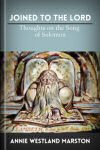
In this book, Annie Marston shares personal lessons gained from her study of the Song of Solomon. Her practical study provide Christians with insights into an often opaque book of the Bible.
Annie W. Marston was born at Uley, Gloucestershire, in 1852. She is the author of From Mountain to Mountain, Dost Thou Believe?, The Children of Africa, and The Great Closed Land.
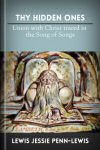
Jessie Penn-Lewis wrote this book believing that no book in the Bible requires a more reverent reading than Song of Songs. Although it is often described as a love song between Christ and his church, Penn-Lewis explains how it also acts a mirror in which the reader can behold, as in a glass, the glory of the Lord, so that his soul may be transfigured into the same image.
Jessie Penn-Lewis (1861–1927) was a Welsh evangelical speaker and author. While touring the United States, Jessie was spoke at the Moody Bible Institute Workers Conference in 1900 and the President, R.A. Torry, introduced her as “one of the most gifted speakers the world had ever known.”
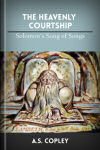
In this work, A.S. Copley describes the Song of Songs as a courtship grounded in history. It is a book that stands in the middle of the Bible as the divine pattern of true affection, corresponding beautifully with Ephesians 5:25.
A.S. Copley was a pastor in Kansas City, Missouri and editor of the Pentecostal periodical, Grace and Glory.
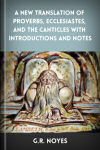
This book completes a series of translations of the Hebrew poetry. George R. Noyes provides introductions and notes designed primarily for the use of readers unacquainted with the Hebrew language.
George R. Noyes was an eminent nineteenth-century Greek and Hebrew scholar, proficient in sacred literature. He was a Unitarian minister and scholar at Harvard, graduating in 1818. He was licensed to preach in 1822 and served as tutor from 1823–1827. He was then ordained pastor of the First Unitarian Society of Petersham, Massachusetts. He received his DD from Harvard and served as the Hancock Professor of Hebrew and Dexter Lecturer on Biblical Literature in Harvard’s Theology Department.
Reviews
0 ratings